Many thought the soccer craze in Russia would not last and the shiny new stadiums built for the FIFA World Cup would rapidly become “white elephants” the nation could not afford, but in the six months since the hosting of the month-long extravaganza some of the stadiums have attracted big crowds and attendance rates have gone through the roof.
Russia spent more than US$10 billion on stadiums and infrastructure for the World Cup. Each of the 11 host cities either got a brand new arena or had an existing one refurbished.
Of the seven new stadiums built for the tournament, three are located in Volgograd, Nizhny Novgorod and Saransk.
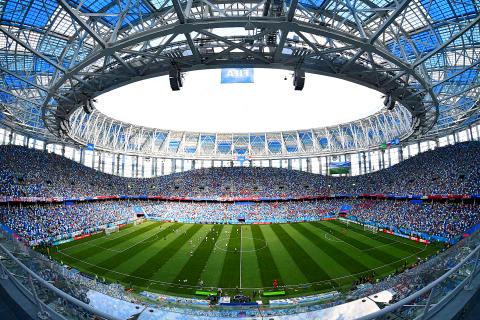
Photo: AFP
The three second-tier clubs in the cities had record attendances in the 2018-2019 season.
Volgograd averaged more than 22,000 spectators per home game since the beginning of the season, according to statistics.
Nizhny Novgorod averaged just under 20,000 spectators, while nearly 15,000 watched games in Saransk in central Russia.
Russian Premier League crowds have also been boosted. By the start of a winter break in December last year, the average attendance in the top flight had grown by about 30 percent to 17,000 spectators per match compared with previous years.
Russian media have taken great delight in writing about the nation’s packed modern arenas, a far cry from windswept antiquated Soviet-era stadiums.
In late August last year, 31,000 people gathered at Nizhny Novgorod’s 45,000-seat stadium located at the confluence of the Volga and Oka rivers to watch Avangard Kursk beat the city’s local team 1-0.
“Thank God football on the whole and players in particular have become very popular in Nizhny,” said Alexei Rokotov, a sports journalist in the city of 1.2 million people.
He said residents — and not just fans of the local team — liked to spend their time at the stadium, comparing such outings to a visit to the movies.
“People just come to watch football, to look at the stadium, it’s not far from the center,” he said.
At between 200 and 400 rubles (US$3.05 to US$6.09), ticket prices in the city are attractive, too.
Many had criticized the Sochi 2014 Winter Olympic Games for their exorbitant costs and one of the government’s top concerns was to avoid the World Cup stadiums going to waste after the showpiece was over.
Russian President Vladimir Putin has demanded officials draft a World Cup “legacy” program to raise attendances and boost youth player development.
The sports-mad Russian leader banned local authorities from allowing the stadiums to be turned into outdoor markets like in the 1990s.
The authorities are pulling out all the stops to support soccer clubs in the cities where the new stadiums were built.
“In Russia, football is very politicized,” said Kirill Kulakov, chief of the Moscow-based RMA Business School and head of its department of sport management.
In Nizhny Novgorod, authorities saved a local club from bankruptcy in the hope that it would eventually join the top flight.
The region promised tax cuts to companies supporting the club.
Russia moved St Petersburg-based Dynamo — which had long languished in the shadow of Zenit St Petersburg — to the Black Sea resort of Sochi to occupy the Fisht Olympic Stadium.
They play in the Russian second tier under a new name — Sochi.
However, filling Sochi’s 47,000-seat stadium has not been easy.
Crowds rarely exceed a few thousand spectators.
With Russia’s economy hampered by relatively low crude oil prices and Western sanctions, maintenance of the new arenas is expected to be problematic.
“The stadiums are supposed to be handed to local authorities and then privatized if there’s a request for it from local clubs,” Kulakov said.
Depending on the venue, the upkeep costs 200 million rubles a year and will likely get more costly.
Currently the property of the federal government, the arenas are expected to become responsibility of regional authorities from June.
“Some of the stadiums were built where there are no representatives of the Premier League and I know that additional work is ongoing because they were built in a rush,” Kulakov said. “People did not think what would happen after the World Cup.”
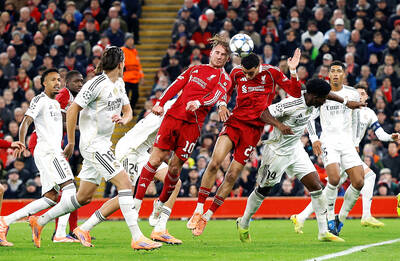
ANFIELD BLUES: Kylian Mbappe arrived at Anfield on a run of 21 goals in 17 games, but he managed just three attempts in the match, none of them hitting the target Kylian Mbappe has been nearly unstoppable this season, but he hit a roadblock in their UEFA Champions League match at Anfield on Tuesday. For the second year running, the Real Madrid forward had a night to forget at Merseyside as Liverpool won 1-0. Mbappe looked a shadow of the player who has been tearing defenses apart all season. “We were lacking that threat in the final third,” said Madrid coach Xabi Alonso, without naming Mbappe individually. The FIFA World Cup winner for France rarely looked capable of finding a breakthrough against a Liverpool team who have been so defensively fragile for much of the
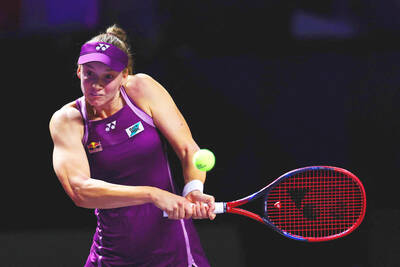
LOCAL SUCCESS: In the doubles, Taiwan’s Hsieh Su-wei and Jelena Ostapenko of Latvia defeated Italians Sara Errani and Jasmine Paolini in straight sets Elena Rybakina on Monday punched her ticket to the WTA Finals last four with an impressive 3-6, 6-1, 6-0 victory over second seed Iga Swiatek in round-robin play in Riyadh. After cruising past Amanda Anisimova in her opener on Saturday, Rybakina claimed her second win of the week to guarantee herself top spot in the Serena Williams Group. Anisimova on Monday rallied back from a set and a break down to triumph 4-6, 6-3, 6-2 in her all-American battle with seventh seed Madison Keys, who has been eliminated from the competition. “Madi was playing so well, it was quite a battle out there,”
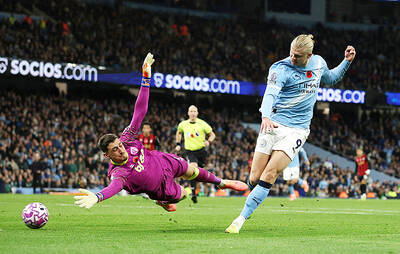
Erling Haaland on Sunday scored twice to propel Manchester City up to second in the English Premier League with a 3-1 win over AFC Bournemouth. The Cherries started the day in second thanks to the longest unbeaten run in the English top flight, but Andoni Iraola’s side were undone by the scintillating form of the Norwegian striker, who took his tally to 13 Premier League goals in 10 games. Haaland’s relentless streak is maintaining City’s title challenge as they reduced the gap to leaders Arsenal back to six points and edged one point ahead of Liverpool, who they face at the weekend. “Important
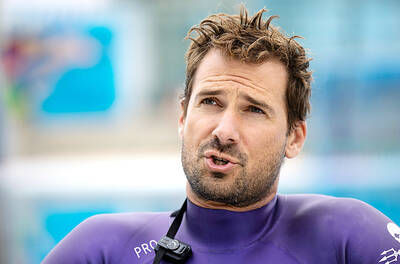
For almost 30 minutes, Vitomir Maricic did not take a breath. Face down in a pool, surrounded by anxious onlookers, the Croatian freediver fought spasming pain to redefine what doctors thought was possible. When he finally surfaced, he had smashed the previous Guinness World Record for the longest breath-hold underwater by nearly five minutes. However, even with the help of pure oxygen before the attempt, it had pushed him to the limit. “Everything was difficult, just overwhelming,” Maricic, 40, told reporters, reflecting on the record-breaking day on June 14. “When I dive, I completely disconnect from everything, as if I’m not even there.